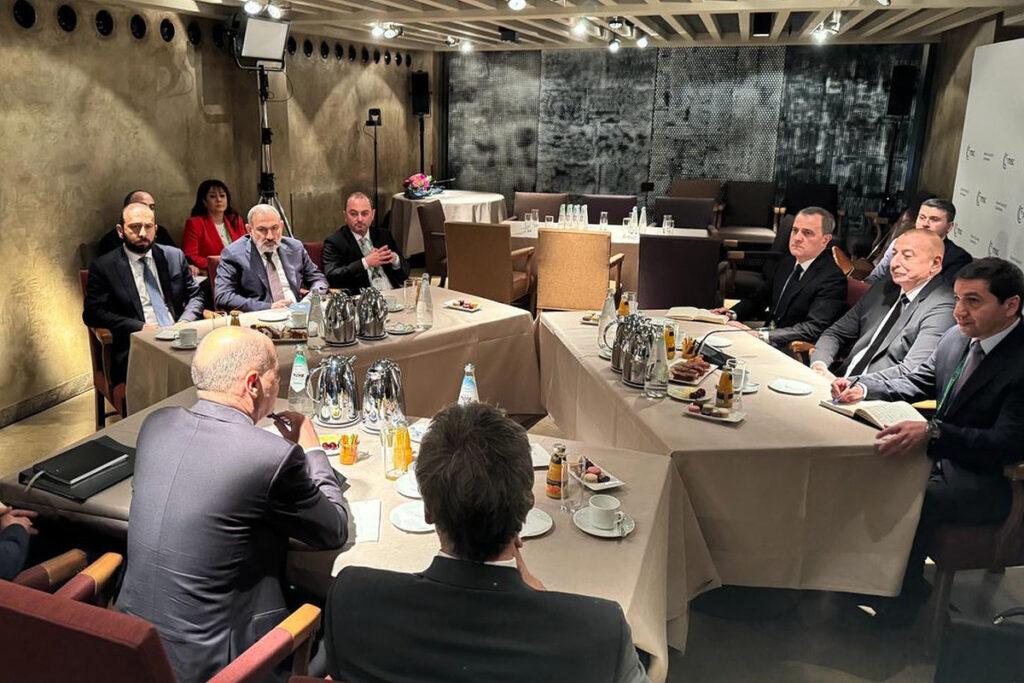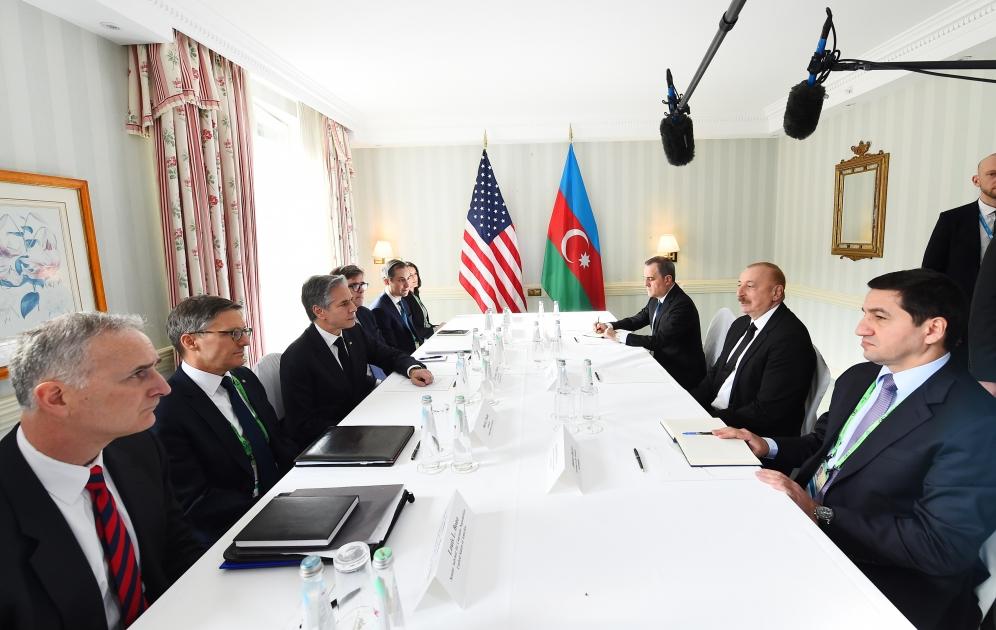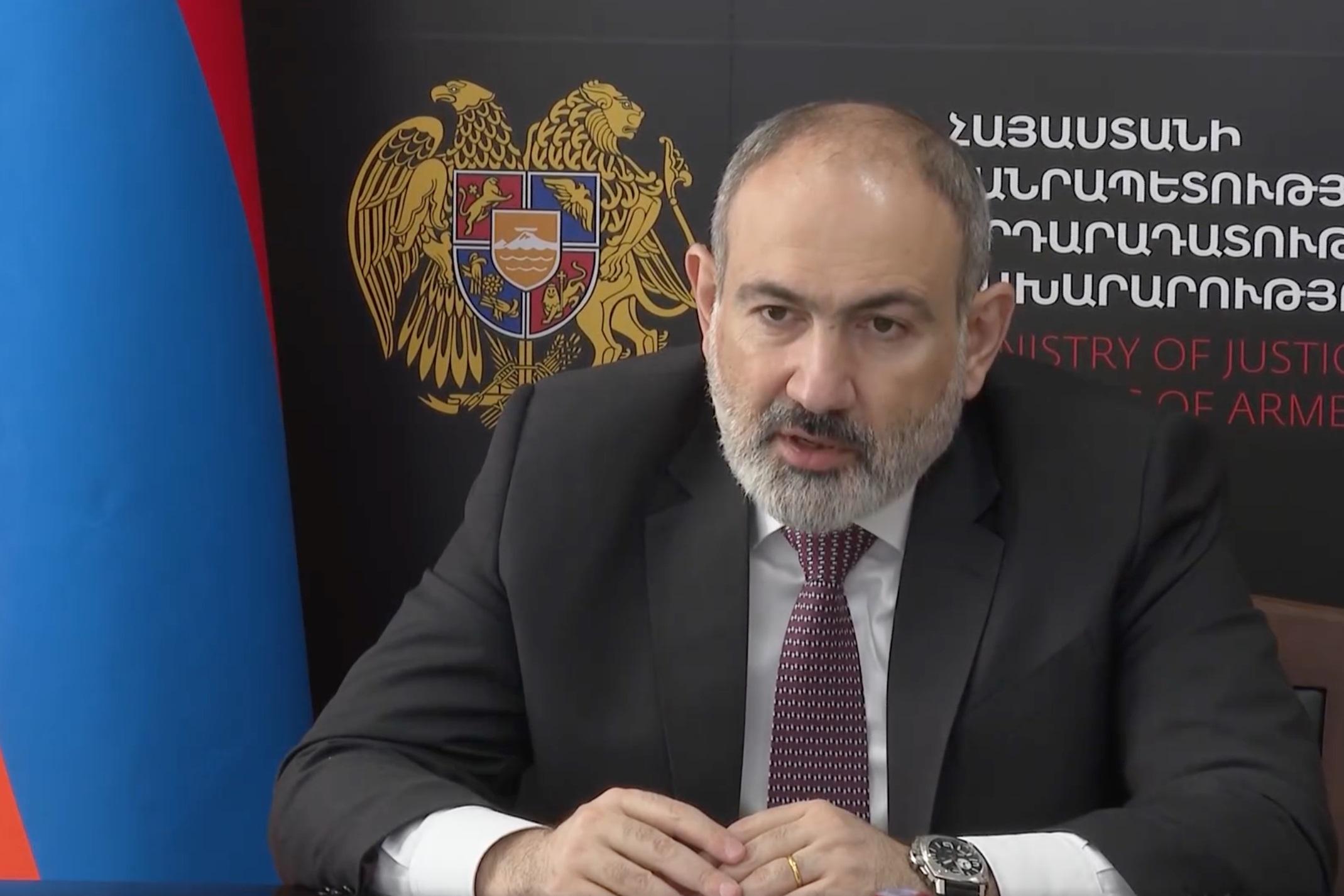Azerbaijani president's Munich diplomacy Bridging divides and forging paths
Azerbaijani President Ilham Aliyev’s presence at the 60th Munich Security Conference and meetings he had on the heels of the February 7, 2024, snap presidential elections, shed light on a series of issues of regional and global importance and marked a significant diplomatic endeavor aimed at fostering dialogue, resolving conflicts, and advancing Baku’s strategic interests on the global stage.
German Chancellor Olaf Scholz-brokered meeting between President Ilham Aliyev and Prime Minister Nikol Pashinyan on the fringes of the influential annual conference proved significant in terms of Azerbaijan’s commitment in the eyes of the international actors to the peace agenda to re-establish lasting peace in the war-ravaged region despite Baku’s indisputable military superiority over Yerevan in all aspects.
The Azerbaijani president’s meeting with the Armenian prime minister underscored a pivotal effort towards regional reconciliation and his allegiance to diplomatic engagement that reflected his willingness to address longstanding disputes and explore avenues for peace-building in the Caucasus region.

By participating in discussions at the MSC, Aliyev demonstrated Azerbaijan's commitment to multilateralism and constructive engagement with the international community. His interactions with global leaders and CEOs of leading international companies provided a platform to address key regional and global challenges, from security concerns to economic cooperation.
The meeting with US Secretary of State Antony Blinken highlighted Aliyev's proactive approach to strengthening bilateral ties with key allies. Discussions on COP29 and the normalization of relations between Baku and Washington signaled a concerted effort to expand Azerbaijan's diplomatic footprint and enhance its role in addressing pressing global issues.
President Ilham Aliyev, recognizing the existing de facto peace in the region, underscored the importance of further enhancing Azerbaijan-US bilateral relations beyond the ongoing normalization process between Armenia and Azerbaijan.
Azerbaijan’s dedication to peace also topped the agenda of the February 17 meeting between President Ilham Aliyev and US Secretary of State Antony Blinken in Munich, where the president underscored Azerbaijan's support for the normalization of relations and the peace agenda with Armenia. Highlighting his February 17 meeting with Armenia’s Nikol Pashinyan, Ilham Aliyev evaluated it as a positive step to the agreements, reached at negotiations on a peace treaty and meetings on border delimitation.

Another aspect of Azerbaijani President Ilham Aliyev’s Munich agenda at the meeting with Antony Blinken was to discuss COP29 as well normalization of relations between Baku and Washington without linking it to relations with Armenia.
The Azerbaijani president’s approach in Munich reflected a pragmatic diplomatic strategy, characterized by a focus on concrete outcomes and mutual interests. By prioritizing discussions on COP29 and bilateral relations separate from the Armenia-Azerbaijan context, Aliyev aimed to build bridges and pursue pragmatic solutions without entangling unrelated issues.
At a meeting with Senior Managing Director of the World Bank Axel van Trotsenburg in Munich, the president mulled Azerbaijan’s upcoming hosting of COP29, emphasizing that it is a manifestation of the country's support for green transition and combating climate change, voicing the WB’s readiness to cooperate with Azerbaijan in this regard. With COP29 focusing on climate finance, they noted that within the framework of this significant event, there are ample opportunities for cooperation between the WB and Azerbaijan.
Overall, President Aliyev's presence in Munich signifies Azerbaijan's diplomatic engagement on multiple fronts, from regional reconciliation efforts to global partnerships, showcasing a proactive and pragmatic approach to advancing national interests in the international arena.
Can Germany play a neutral role in the reconciliation of Armenia and Azerbaijan?
Following the Munich meeting between the Azerbaijani and Armenian leaders and their approval of measures, designed to advance efforts for a peace deal, questions raised if Germany could potentially play a neutral role in the reconciliation of Armenia and Azerbaijan.
In view of several factors, pundits believe Germany has a history of playing a neutral role in international conflicts and mediating disputes, and this neutrality is often perceived positively by conflicting parties, as it signals an impartial approach to conflict resolution. As a leading and influential member of the EU, Germany holds significant influence in international diplomacy, and its reputation as a mediator and facilitator of dialogue positions it as a credible actor capable of fostering reconciliation between Armenia and Azerbaijan.
Berlin has maintained diplomatic relations with both Armenia and Azerbaijan, providing them with channels for communication and mediation between the two nations in conflict for over 30 years. Its diplomatic presence and established relationships can facilitate dialogue and negotiations between conflicting parties. Also, Germany has a track record of engaging in mediation efforts in various global conflicts.
Its involvement though unsuccessful in the Minsk Group’s peace processes on the then Nagorno-Karabakh conflict demonstrates its willingness to contribute to conflict resolution efforts in the region.
As a member of the EU, Germany can leverage the EU's collective diplomatic weight and resources to support reconciliation efforts between Armenia and Azerbaijan. The EU's commitment to peace-building and conflict resolution aligns with Germany's efforts to promote stability and cooperation in its neighbouring regions.
While Germany's role in mediating between Armenia and Azerbaijan would require careful navigation of geopolitical complexities and historical sensitivities, its neutrality, international standing, diplomatic channels, and track record in mediation position it as a potentially effective mediator in facilitating reconciliation between the two countries.
Baku urges Yerevan to change the constitution
In a similar vein, Azerbaijan has called on Armenia to make changes to its constitution which contains territorial claims against Azerbaijan. Armenia, on the other hand, claims that Azerbaijan would attack it and thus plays a negative role, hindering Baku's earnest efforts. Azerbaijan's call for Armenia to amend its constitution to remove territorial claims against Azerbaijan reflects Baku's stance on resolving the longstanding territorial disputes between the two countries. Azerbaijan views these territorial claims as obstacles to achieving a peaceful resolution and normalization of relations between the two nations.
Armenia's resistance at this stage to amend its constitution may stem from historical and political factors. The inclusion of territorial claims against Azerbaijan in Armenia's constitution reflects the deeply entrenched nature of the conflict and the complex dynamics surrounding the issue in question.

Armenia's assertion that Azerbaijan would attack it underscores the ongoing security concerns and mutual distrust between the two countries. The conflicts in and around Karabakh heightened tensions and exacerbated fears of military escalation, leading both sides to maintain a wary stance regarding potential hostilities.
Conclusion
The territorial disputes between Azerbaijan and Armenia have broader implications for regional stability and security in the South Caucasus. The involvement of regional powers and international actors adds complexity to the situation and underscores the need for diplomatic efforts to address the root causes of the conflict and prevent further escalation. Resolving the territorial disputes and addressing security concerns between Azerbaijan and Armenia requires sustained diplomatic efforts and a commitment to dialogue and negotiation in concert with military pressure.
Overall, the ongoing tensions between Azerbaijan and Armenia, including Azerbaijan's call for constitutional changes and Armenia's security concerns, underscore the complex nature of the territorial disputes and the challenges involved in achieving a peaceful resolution to the longstanding conflict. Diplomatic engagement and constructive dialogue remain essential for reducing tensions and promoting stability in the region.








